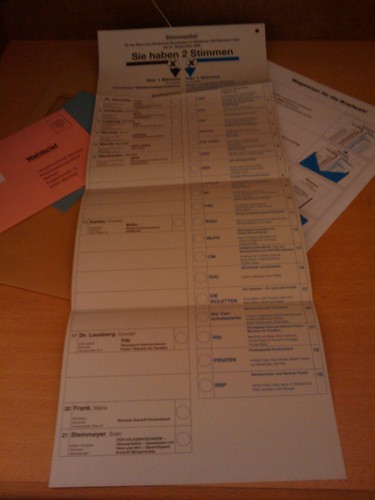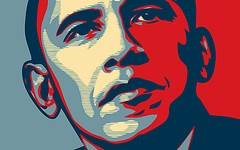
 photo credit: daklebtwasTomorrow, June 7, 2009, the people of Europe elect the next European Parliament. Perhaps less well-known, this date also coincides with the local elections in the state of Baden-Württemberg, so besides the European ballot, I will also get to vote for
photo credit: daklebtwasTomorrow, June 7, 2009, the people of Europe elect the next European Parliament. Perhaps less well-known, this date also coincides with the local elections in the state of Baden-Württemberg, so besides the European ballot, I will also get to vote for
- the local town council
- the city council of the city my home town belongs to
- and the district council.
While possibly not the most influential councils of all, the number of elections at once is quite impressive. What makes these elections the most fun of all though, are the concepts of "Kumulieren" and "Panaschieren" that I'll shortly explain to you here.
Let's assume there are three active parties in this election: A light blue one, a pink one, and an orange one. For each of these, you'll receive a ballot containing their designated votees, along with the instructions telling you that you have, for example, 10 votes at your disposal.
Imagine you like the pink party the most. The easiest way to handle this is to take the pink ballot, fold it, and drop it into the ballot box. You'll automatically have given each of the people on the ballot 1 vote. But we are in Germany, and we find "simple" boring, so let's spice that up a bit.
It just happens that you like one guy in the Pink party, Paul Olitician, more than the others. After all, whenever you meet him at the bars, he buys you a beer, and to return the favor, you listen to him explain his political visions in detail. The perfect symbiosis, if you will.
In that case, you can go ahead and "accumulate" up to three votes on Paul, and then spread the remaining seven votes across the other candidates on the ballot. You may end up not having enough votes for each of the party members on there, but that's fine, as one of them is your former high school teacher whom you didn't like very much anyway. The process of giving a person on the ballot more than one vote is called "Kumulieren" in German.
But then, just before and you are done giving away all your votes, you realize there are empty lines left on each of the ballots. Also, you notice your neighbor John is a candidate for the light blue party. You don't want to vote for them as a whole, because you still like the pink party better, but you would like to vote for John. After all, you are still grateful for that one time when he heroically kept you from falling off the ladder when he caught you stealing from his cherry tree.
Luckily, the second concept called "Panaschieren" comes in handy. You manually write John's name onto the pink ballot, allowing you to give your remaining votes to him.
After you're done, you fold the ballot, stuff it into the envelope and drop it into the ballot box. With a strong feeling of accomplishment, you head to the bars. To discuss your successful voting with Paul, and to get rid of that horrific taste the envelope glue left in your mouth. You secretly promise yourself, next time you'll vote for the party to introduce self-adhesive envelopes to the German election system.
Read more…



 ...
... 